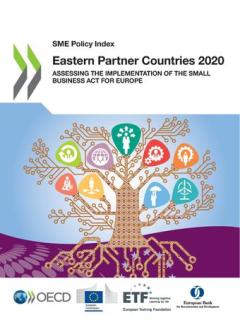
This publication is a unique benchmarking tool to assess and monitor progress in the design and implementation of SME policies against EU and international best practice. It is structured around the ten principles of the Small Business Act for Europe (SBA), which provide a wide range of pro-enterprise measures to guide the design and implementation of SME policies. This report marks the third edition in this series, following assessments in 2012 and 2016. It provides a comprehensive overview of the state of play in the implementation of the ten SBA principles, and monitors progress made since 2016. It also identifies remaining challenges affecting SMEs in the Eastern Partnership (EaP) countries and provides recommendations to address them based on EU and international good practice examples. The 2020 edition also features a novelty: An assessment of three new dimensions going beyond core SME policy (competition, contract enforcement and business integrity) looking at key structural reform priorities that are critical to establishing a level playing field for enterprises of all sizes and ownership types.
Principle 9 - Enable SMEs to turn environmental challenges into opportunities - focuses on environmental Policies and on incentives and instruments for greening SMEs operations. The report notes that, in all EaP countries, SMEs represent the vast majority of all enterprises, which makes them responsible for a considerable portion of industrial emissions. Moreover, implementing policies to support green SMEs can enhance their competitiveness by lowering operational costs, improving market access, supporting participation in green supply chains, and incentivising the deployment of new technology. It, therefore, recommends that policy makers consider the following priorities:
- Strengthening green SME policies by linking them to concrete action plans with measurable targets and timeframes, consulting stakeholders in the development stage, and entrusting one government body with the co-ordination of the overall government approach;
- Raising awareness among SMEs of the benefits of adopting green practices; and
- Supporting the development of environmental management systems and greening public procurement.
